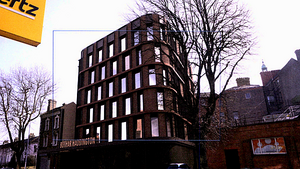New primary care centre to contain methadone clinic despite residents' concerns

Seán McCárthaigh
Plans for a new primary care centre in part of the former Baggot Street Hospital complex in Dublin have been approved by An Coimisiún Pleanála, despite concerns by residents who fear the facility could be used as a methadone clinic.
The decision follows confirmation by the HSE that the new centre will provide methadone and drug counselling services.
Opponents, which include the Pembroke Road Association, have accused the HSE of trying to mislead local people by making no specific reference to a methadone clinic or drug treatment services in planning documents submitted to Dublin City Council.
They claim this constitutes a material change of use from that presented in its original application last year.
The objectors maintain the HSE’s application is “materially and legally deficient”, as well as raising potential impacts in terms of the safety of the community, particularly due to its proximity to schools.
However, a planning inspector said the operation of the primary care centre and the services provided are a matter for the HSE and “not a planning issue.”
The inspector said the proposed development did not involve a change of use, as a primary care team had moved out from the hospital’s complex because of the poor state of the buildings.
Part of the site was used as a drug treatment and community facility until 2019, when it was closed due to the building’s condition.
The Commission upheld the council’s decision to grant planning permission for the proposed new medical centre to be located to the rear of the main hospital building on Baggot Street Upper.
It rejected appeals taken by several residents and business owners, as well as the Pembroke Road Association.
The Commission also separately rejected an appeal by the HSE against a planning condition imposed by the council that it must reduce the height of the proposed six-storey development by one floor.
The HSE had claimed the measure would have minimal impact on the overshadowing of neighbouring properties but would make the development of the primary care centre “unfeasible.”
However, the HSE separately successfully appealed another condition requiring it to submit a maintenance and works programme for the main hospital building, which the Commission’s planning inspector said was “unreasonable and unnecessary.”
The ruling comes just days after the HSE announced that it had put the main Baggot Street Hospital building – a protected structure – up for sale as it was surplus to its requirements and there was no confirmed interest from other State agencies in acquiring the premises.
The HSE intends that the proposed Haddington Road Primary Care Centre will bring together a range of community-based health and social care services, including a pharmacy on part of the former Baggot Street Hospital site at the junction of Haddington Road and Eastmoreland Lane.
Services due to be provided include occupational therapy, physiotherapy, dietetics, speech and language therapy and primary care social work.
However, the HSE informed An Coimisiún Pleanála in June that it would also provide methadone and drug counselling services in the new centre.
The HSE pointed out that such services are already being provided in other primary care centres in Arklow, Bray and Dún Laoghaire, which demonstrated their compatibility with community healthcare settings.
It stressed that drug treatment services would be just one component of a broader range of community health services to be provided in the new facility.
The HSE also noted that methadone dispensing is not an uncommon service provided by pharmacies.
The centre, whose main entrance will be off Haddington Road, will incorporate an existing three-storey Victorian building, which will be interlinked with a new purpose-designed building.
The works will also require the demolition of some buildings on the site including the Baggot Community Hospital.
Subject to compliance with a number of planning conditions, the Commission said the new primary healthcare facility would result “in a compact and sustainable form of urban development at a highly accessible location.”
It also stated the development would not seriously injure the visual or residential amenities of the area or adversely impact its character.
The Commission said the plans were in accordance with national and local planning policies and would also be acceptable in terms of traffic safety and convenience.
Although the Pembroke Road Association recognised the need for a new primary care centre in the area, it criticised its proposed height, which it said would be “disruptive” and “entirely excessive.”
Together with other individual appellants, the Pembroke Road Association also expressed concern that a methadone clinic was being considered as part of the new facility.
The group claimed the layout of the proposed centre with an entirely separate pharmacy “would indicate a methadone dispensing service.”
In its submission to An Coimisiún Pleanála, it accused the HSE of “taking a vow of omerta” about the planned services at the facility.
“This is not a primary care centre but some hybrid medical facility,” said the association’s spokesperson, Susan McCarrick.
The group expressed concern that a methadone clinic could attract drug dealers to the area and claimed a more suitable location for such a facility would be within a major hospital, which would have the necessary security to provide “the safe delivery of such services.”
Meanwhile, the HSE said the sale of the former Baggot Street Hospital will facilitate the redevelopment of historic buildings that are not conducive to modern healthcare provision.
The hospital, known officially as the Royal City of Dublin Hospital, was built in 1832 and closed in 1987.
In a planning report on the new primary care centre, Dublin City Council expressed disappointment with the delay by the HSE in disposing of the main hospital, as it had a detrimental impact on the fabric of the building that was being protected.






